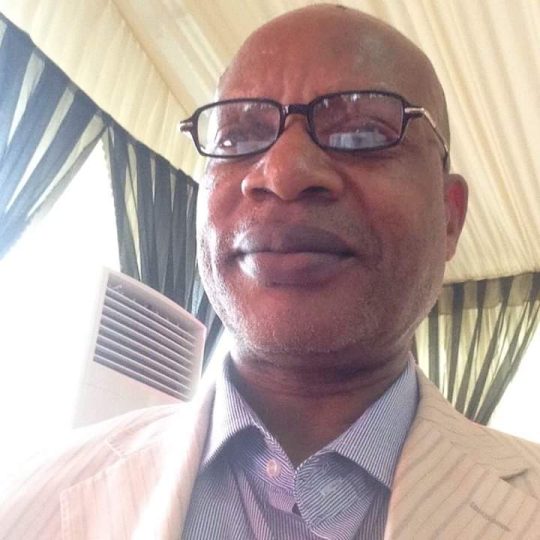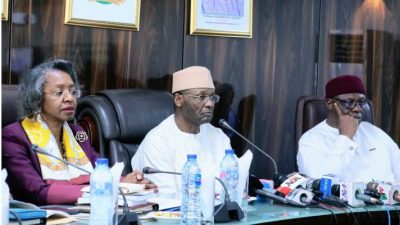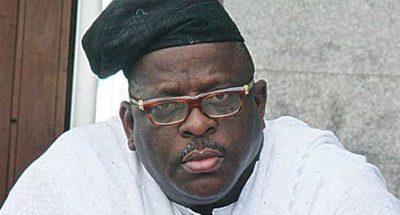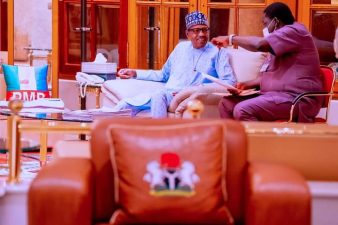By EHICHIOYA EZOMON
Military apologists – in and outside of Government – are conniving to take advantage of fallouts from the February and March Federal and State elections – to foist an illegal contraption of an Interim National Government on Nigeria.
This comes barely 56 days to the May 29, 2023, swearing in of President-elect Bola Ahmed Tinubu of the ruling All Progressives Congress, to replace outgoing President Muhammadu Buhari.
In attempting to abort and supplant an elected government, the anti-democratic elements plan to undermine the amended 1999 Constitution, which’s foundational to existence of Nigeria as a Nation.
Section 1(2) of the Constitution states, unambiguously, that: “The Federal Republic of Nigeria shall not be governed, nor shall any person or group of persons take control of the Government of Nigeria or any part thereof, except in accordance with the provisions of this Constitution.”
For good measure, section 1(1) states that: “This Constitution is supreme and its provisions shall have binding force on all authorities and persons throughout the Federal Republic of Nigeria.”
And section 1(3), reinforcing section 1(1), states that: “If any other law is inconsistent with the provisions of this Constitution, this Constitution shall prevail, and that other law shall to the extent of the inconsistency be void.”
As interim government is unknown to law, its planners will have to suspend section 1(1)-(3) of the Constitution for a soft and safe landing, to impose themselves and their will on Nigerians.
In the February 25 presidential election, Tinubu, a former Lagos State Governor, defeated 17 contestants, including three leading opposition candidates.
They’re former Vice President Atiku Abubakar of Peoples Democratic Party, former Anambra State Governor Peter Obi of Labour Party, and former Kano State Governor Rabiu Musa Kwankwaso of New Nigeria Peoples Party.
But Atiku and Obi claim they each won the poll, and should’ve been declared President-elect, instead of Tinubu, who won in 12 states, scored 8,794,726 votes and secured one-quarter (25%) spread in 27 states.
Atiku, who won in 12 states, polled 6,984,520 votes, and secured 25% in 17 states; and Obi, who claimed 11 states, scored 6,101,533 votes, and secured 25% in 15 states, disagreed with INEC’s returns.
They argue in their petitions to the Presidential Election Petitions Court (PEPC) that Tinubu didn’t meet the requirements of the law, viz: the 1999 Constitution and Electoral Act 2022.
While they’re in court, Atiku and Obi’s supporters and members of their parties have found their ways into the streets, and laid siege to the offices of the Independent National Electoral Commission in Abuja, and several States, in attempts to reverse the declaration of Tinubu, and cancel or annul the poll.
The other day, members of the PDP, led by its “stepped-aside” National Chairman Iyorcha Ayu, and the party candidate, Atiku, protested to the INEC office in Abuja, demanding cancellation of the election, and a second exercise organised “that will be credible and acceptable to Nigerians and the international community.”
Members of ObIdients Movement – supporters of Labour’s Obi – also stormed Abuja streets, with a call to annul the poll.
They pleaded with Buhari to practically breach the Constitution by declining to hand over to Tinubu on May 29, but to form an illegal Inerim National Government – made famous in 1993, after the Military regime of retired Gen. Ibrahim Badamasi Babangida annulled the June 12, 1993, poll won by Chief Moshood Kashimawo Olawale (MKO) Abiola.
Due to intense pressure, both home and abroad, Babangida decided to “step aside” on August 26, 1993, but not before he empanelled an Interim National Government headed by boardroom great, Chief Ernest Shonekan, who lasted only 82 days in power.
Then Chief of Army Staff, Gen. Sani Abacha, took advantage of a November 10, 1993, ruling of a Lagos High Court Judge, the late Dolapo Akinsanya, that illegled the Interim National Goverment.
Justice Akinsanya said: “President Babangida has no legitimate power to sign a decree after August 26, 1993, after his exit, so the decree is void and of no effect.”
Abacha then sacked Shonekan, and established a draconian regime that hunted and eliminated many pro-democracy activists, including Abiola’s wife, Kudirat, gunned down on June 4, 1996, by Abacha’s goons in Lagos.
And five years after annulment of June 12 on June 23, 1993, Abiola died in mysterious circumstances in detention on July 7, 1998, as he strugged to regain his mandate that Justice Akinsanya’s ruling had literally restored in November 1993 sans Abacha’s seizure of power.
It’s President Buhari, who posthumously recognised Abiola on June 12, 2018, as the legitimate winner of June 12, and awarded him the highest National Honour of Grand Commander of the Federal Republic (GCFR) – as an attestation of Abiola as President-elect, though not sworn-in accordingly.
Among those that survived the Abacha killing spree is President-elect Tinubu, who escaped into exile on the Intel that he was marked for elimination by the Abacha hit squad.
Tinubu returned to the country following the political transition programme that retired Gen. Abdulsalami Abubakar’s regime initiated to usher in the Fourth Republic in 1999. He vied for and won election as Governor of Lagos, and was re-elected, and served out his eight-year tenure in 2007.
The foregoing are the tales and horrors that signposted Nigeria’s first Inerim National Government – birthed from a duly appointed and conducted election – but hijacked by the very Military that ordred the election in the first place.
Save Military apologists parading as pseudo-democrats, Nigerians – including Individuals, Ethnic Nationalities, National Association of Nigerian Students, Civil Society Organisations, the 36 State Governors and Senior Lawyers versed in constitutional matters – are genuinely alarmed by the unfolding development.
Amid the economic and social dislocations in the society, can Nigerians face another apparatus imposed this time through the machinations of politicians and supporters that lost elections, in cahoots with cliques within and outside the government?
Can Nigeria withstand aftermaths of annulment of Tinubu’s election, as happened to Abiola of the same ethnic stock 30 years ago?
On the back of uninterrupted 24 years of democratic practice since the return of civilian governance in 1999, Nigerians have delivered a resounding and an unequivocal no to the crusaders and purveyors of an interim government.
And they demand that the Department of State Services (DSS) that blew the whistle on the plot should expose, arrest and prosecute the plotters and backers of the illegal scheme, no matter how highly placed, and wherever they are.
* Mr Ezomon, Journalist and Media Consultant, writes from Lagos, Nigeria.
All comments by contributors are solely their own personal opinions and not of The DEFENDER Newspaper.




